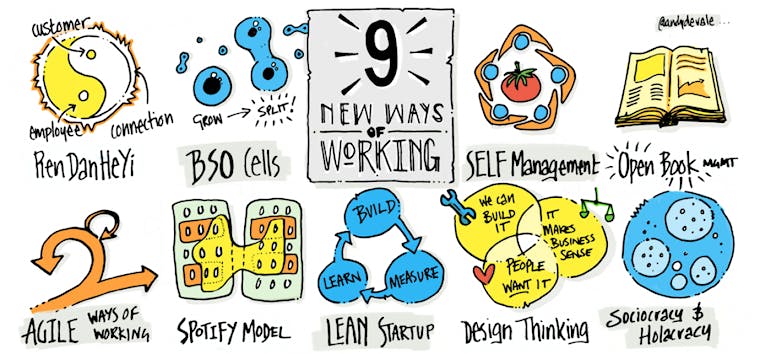The '9 New Ways of Working' That Guide Our Client Work

In pursuit of our mission, to make work more fun, we are doing more and more work with clients. In this work, we use the ‘new ways of working’ and ‘best practices’ discussed in our 8 habits of highly progressive workplaces‘ that we uncovered along the way.

Sketch by Andy de Vale.
But our work is not based solely on our research. It is also informed by the brilliant thinking/practices of pioneers who paved the way before us. Here are some of the concepts, frameworks, and best practices that have inspired us.
The '9 New Ways of Working'
1. Haier's RenDanHeYi platform model
Haier’s RenDanHeYi platform is an organization model we found at Chinese white goods manufacturer Haier. It was specifically adopted for doing business in the internet era.
It helps us transform enterprises from their original pyramid structures into networks of microenterprises.
For more information, read The Haier Dictionary of RenDanHeYi (Public Beta Version).
2. BSO's cell philosophy
BSO’s cell philosophy, developed by Dutch entrepreneur Eckart Wintzen, allows globally decentralized companies to operate on the ‘cell division’ principle.
This is most famously used by the Dutch healthcare organization Buurtzorg. It inspires us to design flatter hierarchies, zero-distance to customers, low overhead, and high employee entrepreneurship.
For more information read Eckart’s Notes by Eckart Wintzen.
3. Self-Management
The Morning Star Self-Management Institute describes a model in which the traditional functions of managers are pushed out to everybody in the organization.
This self-management approach inspires us to make each colleague (as they call them) responsible for their own work, relationships, behaviours, goals and actions—and always with respect to other colleagues affected by their activities.
For more information, read Beyond Empowerment by Doug Kirkpatrick.
4. Open-book Management
Open-book management is based on radical financial transparency. It enables the sharing of financial information between, and informed decision-making by, all employees. Thus enabled, they make better decisions for the benefit of the business, and themselves.
The most notable adoptee is probably the American food group, Zingerman’s.
For more information, read The Great Game of Business by Jack Stack.
5. Agile Ways of Working
Agile Ways of Working is an approach in which self-organizing, cross-functional teams respond rapidly and flexibly to change. Originally adopted for software development, it has now evolved into frameworks like Scrum, Kanban, DevOps and Responsive Org.
Agile Ways of Working inspire us to adopt ideas like adaptive planning, continuous improvement, fast delivery, feedback loops, and evolutionary project development.

6. The Spotify model
The way the Swedish streaming service Spotify develops software is commonly known as ‘The Spotify Model’. It enables the Swedish start-up to scale agility as it grows. Their model has inspired traditional companies like Dutch bank ING.
There is, however, no one way of working at Spotify. Employees are encouraged to continuously learn from, and adapt, their work. Nevertheless, we draw inspiration from the ‘Spotify model’ and how it influenced ING.
7. Lean Startup
Lean Startup is a philosophy in which projects are developed in radically shortened cycles. It depends on fast prototyping, constant experimentation, and iterative product releases. The Business Model Canvas and the Lean Canvas are tools that embrace this approach.
It helps us speed product and service development, by scaling and pivoting rapidly, and without the need for expensive product launches and the inevitable failure of many.
For more information read The Lean Startup by Eric Ries.
8. Design Thinking
Design Thinking is a human-centered approach using elements from the designer’s toolkit (like empathy and experimentation) to explore innovative solutions to all kinds of problems. It was adapted for broader use by David Kelley, who founded design consultancy IDEO
The result is improved decision-making, based on creativity, customer interests, real evidence, and the possibilities of technology—rather than historical data, gut-feeling and instinct.
9. Sociocracy & Holacracy
Sociocracy is an open-source methodology based on distributed authority and transparency. It enables democracy at all levels of an organization. Developed in the late 20th century, it distinguishes itself through consent decision-making, and organizing in circles.
Holacracy used many of the principles of Sociocracy to develop a 21st century commercial methodology. It distributes decision-making to employees working in self-organizing teams.
Sociocracy, Holacracy, and their derivatives (adapted by larger enterprises like Spark) offer alternative frameworks for governance, decision-making, and role definition.
Beyond these '9 new ways of working' there are obviously other major concepts that shape our client work. These include...Reinventing Organizations, Exponential Organizations, Six Simple Rules and Beyond Budgeting, to name just a few.
Let’s be clear: we don’t believe in a one-size-fits-all concept. But we do believe in taking the best from all possible worlds.

